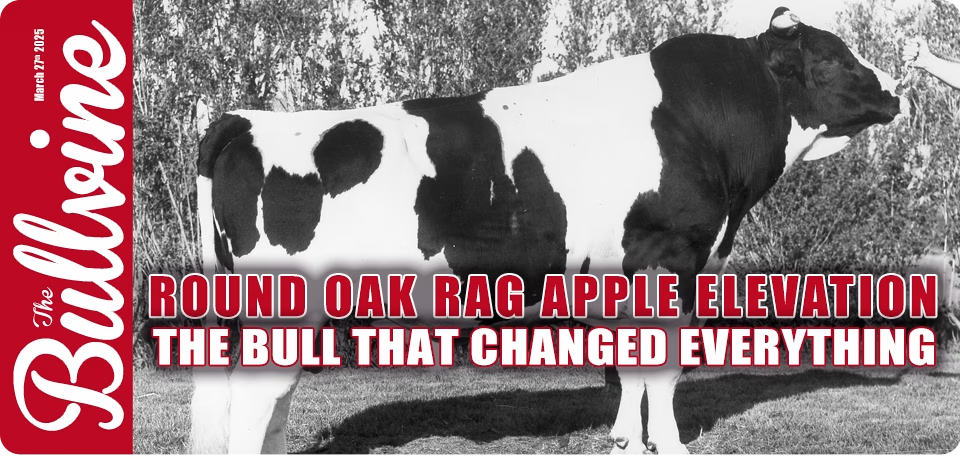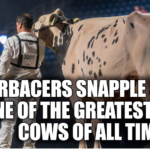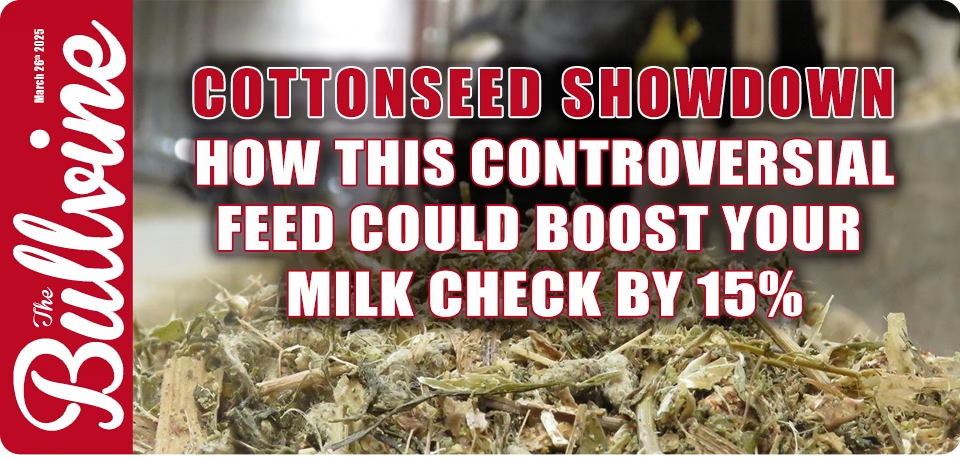Latest News
 Biosecurity Battlefront: How Foot-And-Mouth Disease Outbreaks Are Reshaping Dairy Farm ProtocolsFoot-and-mouth disease resurges in Europe—discover how dairy farms worldwide are racing to overhaul biosecurity or face ruin. EXECUTIVE SUMMARY: Recent foot-and […]
Biosecurity Battlefront: How Foot-And-Mouth Disease Outbreaks Are Reshaping Dairy Farm ProtocolsFoot-and-mouth disease resurges in Europe—discover how dairy farms worldwide are racing to overhaul biosecurity or face ruin. EXECUTIVE SUMMARY: Recent foot-and […] California’s Dairy Dilemma: Can the Golden State’s Industry Survive Its Triple Threat?Can California dairy survive water scarcity, labor laws, and green rules? Innovation vs. exodus in America's milk capital. EXECUTIVE SUMMARY: California’s dairy […]
California’s Dairy Dilemma: Can the Golden State’s Industry Survive Its Triple Threat?Can California dairy survive water scarcity, labor laws, and green rules? Innovation vs. exodus in America's milk capital. EXECUTIVE SUMMARY: California’s dairy […] North Dakota Enacts Groundbreaking Whole Milk Legislation for SchoolsNorth Dakota rebels against federal rules to bring whole milk back to schools. But at what cost?" EXECUTIVE SUMMARY: North Dakota’s new law allowing whole milk […]
North Dakota Enacts Groundbreaking Whole Milk Legislation for SchoolsNorth Dakota rebels against federal rules to bring whole milk back to schools. But at what cost?" EXECUTIVE SUMMARY: North Dakota’s new law allowing whole milk […] CME Dairy Market Report: March 26, 2025 – Mixed Dairy Markets as Nonfat Dry Milk Surges, Cheese Retreats; Class III Futures Continue to Outpace USDA ForecastNDM jumps 2¢ as cheese retreats; Class III futures outpace USDA forecasts. Mixed trading signals ahead of spring flush. EXECUTIVE SUMMARY: CME dairy markets saw […]
CME Dairy Market Report: March 26, 2025 – Mixed Dairy Markets as Nonfat Dry Milk Surges, Cheese Retreats; Class III Futures Continue to Outpace USDA ForecastNDM jumps 2¢ as cheese retreats; Class III futures outpace USDA forecasts. Mixed trading signals ahead of spring flush. EXECUTIVE SUMMARY: CME dairy markets saw […] April 2025 Canadian Genetic Evaluation Updates: What Dairy Farmers Need to Know NowApril 2025 genetic updates reveal game-changing tools for more brilliant herd breeding—discover how to boost profits and sustainability now. EXECUTIVE SUMMARY: […]
April 2025 Canadian Genetic Evaluation Updates: What Dairy Farmers Need to Know NowApril 2025 genetic updates reveal game-changing tools for more brilliant herd breeding—discover how to boost profits and sustainability now. EXECUTIVE SUMMARY: […]
More News
- Trump’s Trade War: Is Pennsylvania’s Dairy Goldmine Becoming a Political Sacrifice Zone?
- Butter Glut 2025: Why Your Cream Check’s About to Get Creamed
- CME Dairy Market Report: March 25, 2025 – Cheddar Prices Rise While Butter Retreats
- How Income Taxes Will Change for Dairy Farmers in 2025: Harvesting Tax Savings Before the TCJA Cliff
- Raw Milk Cheese & H5N1: FDA Sampling & Cornell Study Spark Safety Debate
- The Cortisol Conundrum: Unraveling Dairy’s Stress Myth
- Dairy’s $2 Billion Tax Lifeline: Will Congress Save Co-ops Before It’s To Late?
- H5N1 in Sheep: The Dairy Industry’s Wake-Up Call You Can’t Ignore
- Cheese Yields Hit Historic Highs—But Who’s Getting the Slice? Dairy Farmers vs. Processors in Battle for Component Value
- China’s Dairy Powder Crisis: U.S. Exports Hit Historic Low – Structural Shifts Reshape Global Trade
Top News Posts from Past Week
- A Father’s Final Legacy: What Reed Hostetler’s Tragic Loss Can Teach Every Dairy Farm
- Senseless Livestock Shootings Rock Lancaster County: Community Rallies Behind Affected Farmers
- BREAKING: FMD Confirmed on Three Farms in Slovakia
- Robotic Milking & Mastitis: The Hidden Profit Killer in Your Barn
- H5N1 Strikes Again: Minnesota Dairy Farm Reinfected
- CHINA SLAMS DOOR ON U.S. BEEF: Your Cull Cow Checks Could Take a Massive Hit
- 2025 Genetic Reset: How Rigid Bull Selection Could Cost Your Herd $147,000
- Butter Prices Soar 27% While USDA Slashes Dairy Forecasts.
- FEED EFFICIENCY BOMBSHELL: Yeast Additives Expose the Truth About High-Starch Dairy Diets
- SexTech Dominates March Genomic Rankings
Feature Articles
 Round Oak Rag Apple Elevation: The Bull That Changed EverythingBorn from an unlikely mating, one bull revolutionized global dairy breeding with genetics so powerful they still dominate herds 60 years later. E212 Round Oak R […]
Round Oak Rag Apple Elevation: The Bull That Changed EverythingBorn from an unlikely mating, one bull revolutionized global dairy breeding with genetics so powerful they still dominate herds 60 years later. E212 Round Oak R […] Cottonseed Showdown: How This Controversial Feed Could Boost Your Milk Check by 15%Controversial feed boosts milk checks by 15%? New research reveals how whole cottonseed could be your dairy profit game-changer! E211 Cottonseed Showdown: How T […]
Cottonseed Showdown: How This Controversial Feed Could Boost Your Milk Check by 15%Controversial feed boosts milk checks by 15%? New research reveals how whole cottonseed could be your dairy profit game-changer! E211 Cottonseed Showdown: How T […] Making Dreams Come True: The Journey of Tom & Kelli CullFrom small farms to industry legends: How Tom & Kelli Cull’s grit, innovation, and "Never Give Up" mantra turned Budjon Farms into a dairy dynasty. E210 Mak […]
Making Dreams Come True: The Journey of Tom & Kelli CullFrom small farms to industry legends: How Tom & Kelli Cull’s grit, innovation, and "Never Give Up" mantra turned Budjon Farms into a dairy dynasty. E210 Mak […] The Great Holstein Shakeup: How 16 Years Rewrote Breeding RulesHow Holstein breeding flipped from show-ring beauty to farm profitability: The 16-year revolution that's transforming dairy genetics forever. E208 The Great Hol […]
The Great Holstein Shakeup: How 16 Years Rewrote Breeding RulesHow Holstein breeding flipped from show-ring beauty to farm profitability: The 16-year revolution that's transforming dairy genetics forever. E208 The Great Hol […] Michael Heath’s Enduring Legacy: How One Man’s Passion Redefined Dairy ExcellenceTwo years gone, but his legacy thrives: How Michael Heath's unparalleled eye for cattle and generous spirit continue to shape the dairy industry today. E207 Mic […]
Michael Heath’s Enduring Legacy: How One Man’s Passion Redefined Dairy ExcellenceTwo years gone, but his legacy thrives: How Michael Heath's unparalleled eye for cattle and generous spirit continue to shape the dairy industry today. E207 Mic […]
More Articles
- How Smart Dairy Farmers Are Slashing Methane While Boosting Profits
- The Cow That Built an Empire: Comestar Laurie Sheik’s Unstoppable Genetic Legacy
- Bird Flu Bombshell: Dairy Cows Losing a Full Ton of Milk with No Recovery
- GENETIC GIANTS DETHRONED: How Dairy Farmers and Beef Upstarts Hijacked 75% of the Beef-on-Dairy Gold Rush
- Bull in a China Shop: How Juan Moreno Turned the Dairy World Upside Down
- Transform Your Dairy Economics: How Beef-on-Dairy Crossbreeding Delivers 200% ROI
- The $3.5 Million Buffer Bombshell: How Rumen pH Management Is Revolutionizing Dairy Profits in 2025
- The Maternal Mastermind: How Douglas Dunton’s Breeding Philosophy Revolutionized Holstein Genetics
- Transforming Dairy Fertility: Machine Learning Isn’t Just the Future—It’s Here Now
- FROM TRAGEDY TO TRIUMPH: The Unstoppable Journey of Holstein Legend Nico Bons
Top Feature Articles from the Past Month
- Top 15 Best Milk Brands in the USA: Unveiling the Cream of the Crop
- 10 Sires To Breed The Next World Dairy Expo Grand Champion
- Why Donald Trump Hates Canada’s Dairy Supply System
- The Cow That Built an Empire: Comestar Laurie Sheik’s Unstoppable Genetic Legacy
- CAPTAIN: The Bull That Rewrote the Rules for Modern Breeding
- The $4,300 Gamble That Reshaped Global Dairy Industry: The Pawnee Farm Arlinda Chief Story
- Making Dreams Come True: The Journey of Tom & Kelli Cull
- FROM TRAGEDY TO TRIUMPH: The Unstoppable Journey of Holstein Legend Nico Bons
- From Pasture to Powerhouse: The GenoSource Story
- Bull in a China Shop: How Juan Moreno Turned the Dairy World Upside Down
- Round Oak Rag Apple Elevation: The Bull That Changed Everything
-
Round Oak Rag Apple Elevation: The Bull That Chang…
Andrew Hunt Mar 27, 2025Born from an unlikely mating, one bull revolutionized global dairy breeding with genetics so powerful they still dominate herds 60 years later. E212 Round Oak Rag Apple Elevation: The Bull That | RSS.com Round Oak Rag Apple Elevation (1965-1979), the legendary Holstein sire dubbed “Bull of t… Read More
- Cottonseed Showdown: How This Controversial Feed Could Boost Your Milk Check by 15%
-
Cottonseed Showdown: How This Controversial Feed C…
Andrew Hunt Mar 26, 2025Controversial feed boosts milk checks by 15%? New research reveals how whole cottonseed could be your dairy profit game-changer! E211 Cottonseed Showdown: How This Controversial F | RSS.com Forget what you've heard about cottonseed risks—new research published in the Journal of Dairy Science… Read More
- Making Dreams Come True: The Journey of Tom & Kelli Cull
-
Making Dreams Come True: The Journey of Tom &…
Karen Hunt Mar 25, 2025From small farms to industry legends: How Tom & Kelli Cull’s grit, innovation, and "Never Give Up" mantra turned Budjon Farms into a dairy dynasty. E210 Making Dreams Come True: The Journey of Tom & | RSS.com Have you ever met someone whose passion is so infectious that you want to drop e… Read More
- The Great Holstein Shakeup: How 16 Years Rewrote Breeding Rules
-
The Great Holstein Shakeup: How 16 Years Rewrote B…
Murray Hunt Mar 24, 2025How Holstein breeding flipped from show-ring beauty to farm profitability: The 16-year revolution that's transforming dairy genetics forever. E208 The Great Holstein Shakeup: How 16 Years Rewr | RSS.com Do you know what blows my mind? How completely different Holstein breeding looks today com… Read More
- Michael Heath’s Enduring Legacy: How One Man’s Passion Redefined Dairy Excellence
-
Michael Heath’s Enduring Legacy: How One Man’s Pas…
Andrew Hunt Mar 23, 2025Two years gone, but his legacy thrives: How Michael Heath's unparalleled eye for cattle and generous spirit continue to shape the dairy industry today. E207 Michael Heath’s Enduring Legacy: How One Man’ | RSS.com It's hard to believe it's been two years since we lost him. I can't help but ref… Read More
- How Smart Dairy Farmers Are Slashing Methane While Boosting Profits
-
How Smart Dairy Farmers Are Slashing Methane While…
Andrew Hunt Mar 22, 2025Climate zealots call your cows climate criminals, but savvy dairy farmers are turning methane reduction into cold, hard cash. Here's how they're doing it. E206 How Smart Dairy Farmers Are Slashing Methane | RSS.com The climate crusaders have dairy in their crosshairs, but savvy farmers aren'… Read More
- The Cow That Built an Empire: Comestar Laurie Sheik’s Unstoppable Genetic Legacy
-
The Cow That Built an Empire: Comestar Laurie Shei…
Andrew Hunt Mar 21, 2025How an unassuming cow built a global dairy empire. Discover how Laurie Sheik's genetics dominate barns worldwide—40 years later. E205 The Cow That Built an Empire: Comestar Laurie | RSS.com A pivotal moment in Holstein history as a young Comestar Laurie Sheik VG-88 23* claims second place in… Read More
- Bird Flu Bombshell: Dairy Cows Losing a Full Ton of Milk with No Recovery
-
Bird Flu Bombshell: Dairy Cows Losing a Full Ton o…
Andrew Hunt Mar 20, 2025Bird flu bombshell: One cow loses 900kg milk, never recovers, costs $950. Cornell’s study reveals that 76% of infections are invisible. Is your herd next? E204 Bird Flu Bombshell: Dairy Cows Losing a Full | RSS.com The dairy industry just got hit with cold, hard proof of what smart producers… Read More
- GENETIC GIANTS DETHRONED: How Dairy Farmers and Beef Upstarts Hijacked 75% of the Beef-on-Dairy Gold Rush
-
GENETIC GIANTS DETHRONED: How Dairy Farmers and Be…
Andrew Hunt Mar 19, 2025Traditional genetics companies are caught sleeping while dairy farmers and beef upstarts steal 75% of the booming beef-on-dairy market. Who's winning? E203 GENETIC GIANTS DETHRONED: How Dairy Farmers a | RSS.com The titans of dairy genetics have been caught with their pants down, and they're… Read More
- Bull in a China Shop: How Juan Moreno Turned the Dairy World Upside Down
-
Bull in a China Shop: How Juan Moreno Turned the D…
Andrew Hunt Mar 18, 2025This Colombian farm kid didn’t just enter dairy’s china shop—he deliberately smashed outdated breeding practices and rebuilt the entire industry. E202 Bull in a China Shop: How Juan Moreno Turned | RSS.com Juan Moreno, CEO of STgenetics, stands at the forefront of his company’s facilities wh… Read More
Tanbark Trail
 Is Erbacers Snapple Shakira One of the Greatest Show Cows of All Time?Uncover why Erbacres Snapple Shakira stands among the top dairy show cows of all time. What makes her excel in the competitive dairy arena? E55 Is Erbacers Snapple Shakira One of the Greatest Show Cows of All Time? From the moment she steps into the […]
Is Erbacers Snapple Shakira One of the Greatest Show Cows of All Time?Uncover why Erbacres Snapple Shakira stands among the top dairy show cows of all time. What makes her excel in the competitive dairy arena? E55 Is Erbacers Snapple Shakira One of the Greatest Show Cows of All Time? From the moment she steps into the […] The Royal Winter Fair 2024 – JerseyJudge Jeff Sales NTENSE JOEL DELPHIE ETGrand ChampionThe Royal - Jersey Show 2024WEEKSDALE/HI-CALIBER/ROCK ALLEN/F&D BORBA, BREADALBANE, PE c LEACHLAND VIDEO MOCHA K Intermediate Champion The Royal - Jersey Show 2024 WEEKSDALE HOLSTEINS, BRE […]
The Royal Winter Fair 2024 – JerseyJudge Jeff Sales NTENSE JOEL DELPHIE ETGrand ChampionThe Royal - Jersey Show 2024WEEKSDALE/HI-CALIBER/ROCK ALLEN/F&D BORBA, BREADALBANE, PE c LEACHLAND VIDEO MOCHA K Intermediate Champion The Royal - Jersey Show 2024 WEEKSDALE HOLSTEINS, BRE […] The Royal Winter Fair 2024 – HolsteinJudge Blair Weeks JEFFREY-WAY HARD ROCK TWIGS Grand Champion The Royal - Holstein Show 2024 K. DOEBERIENER, L. BOWEN & PAT CONROY, R&F LIVESTOCK INC, & WALKER DAIRY INC. Grand Champion: Jeffrey-Way Hard Rock Twigs, 1st 4-year-old, K Doebe […]
The Royal Winter Fair 2024 – HolsteinJudge Blair Weeks JEFFREY-WAY HARD ROCK TWIGS Grand Champion The Royal - Holstein Show 2024 K. DOEBERIENER, L. BOWEN & PAT CONROY, R&F LIVESTOCK INC, & WALKER DAIRY INC. Grand Champion: Jeffrey-Way Hard Rock Twigs, 1st 4-year-old, K Doebe […] The Royal Winter Fair 2024 – Red & White HolsteinNovember 4th 2024 Judge: Markus Hehli, Rimbey, AB PREMIUM APPLE CRISP LILLY Grand Champion The Royal - Red & White Holstein Show BUTLERVIEW FARM, CHEBANSE, IL Grand Champion: Premium Apple Crisp Lilly (Apple-Crisp), 1st 5-year-old, Butlerview Far […]
The Royal Winter Fair 2024 – Red & White HolsteinNovember 4th 2024 Judge: Markus Hehli, Rimbey, AB PREMIUM APPLE CRISP LILLY Grand Champion The Royal - Red & White Holstein Show BUTLERVIEW FARM, CHEBANSE, IL Grand Champion: Premium Apple Crisp Lilly (Apple-Crisp), 1st 5-year-old, Butlerview Far […] TD Canadian 4-H Dairy ClassicNovember 4th 2024 Judge: Curtis McNeil, ON JUNIOR SHOWMANSHIP, 12-14 years old McKenzie Howard, Burgessville, ONHODGLYNN ACTIONMAN HARISSA, HOCANF14971465 Emily Smygwaty, Russell, ONKINGSWAY WARRIOR LOOKOUT, HOCANF14798896 Alyson […]
TD Canadian 4-H Dairy ClassicNovember 4th 2024 Judge: Curtis McNeil, ON JUNIOR SHOWMANSHIP, 12-14 years old McKenzie Howard, Burgessville, ONHODGLYNN ACTIONMAN HARISSA, HOCANF14971465 Emily Smygwaty, Russell, ONKINGSWAY WARRIOR LOOKOUT, HOCANF14798896 Alyson […]
The Bullvine LLC © 2025 | Terms of Use | Community Guidelines | Privacy Policy |
Manage Consent
To provide the best experiences, we use technologies like cookies to store and/or access device information. Consenting to these technologies will allow us to process data such as browsing behavior or unique IDs on this site. Not consenting or withdrawing consent, may adversely affect certain features and functions.
Functional Always active
The technical storage or access is strictly necessary for the legitimate purpose of enabling the use of a specific service explicitly requested by the subscriber or user, or for the sole purpose of carrying out the transmission of a communication over an electronic communications network.
Preferences
The technical storage or access is necessary for the legitimate purpose of storing preferences that are not requested by the subscriber or user.
Statistics
The technical storage or access that is used exclusively for statistical purposes.
The technical storage or access that is used exclusively for anonymous statistical purposes. Without a subpoena, voluntary compliance on the part of your Internet Service Provider, or additional records from a third party, information stored or retrieved for this purpose alone cannot usually be used to identify you.
Marketing
The technical storage or access is required to create user profiles to send advertising, or to track the user on a website or across several websites for similar marketing purposes.















